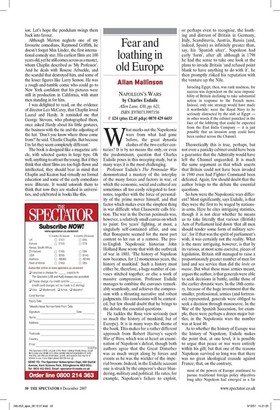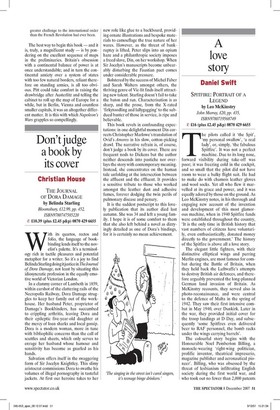Fear and loathing in old Europe
Allan Mallinson NAPOLEON'S WARS by Charles Esdaile Allen Lane, £30, pp. 621, ISBN X9780713997156 © £24 (plus £2.45 p&p) 0870 429 6655 What marks out the Napoleonic wars from what had gone before, the great dynastic clashes of the two earlier centuries? It is by no means the only, or even the predominant, question that Charles Esdaile poses in this sweeping study, but in many ways it is the most challenging.
Professor Esdaile's The Peninsular War demonstrated a mastery of the interplay of the many forces and factors in war, of which the economic, social and cultural are sometimes all too easily relegated to footnotes, together with the force of personality of the prime mover himself, and that factor which makes even the simplest thing in war difficult: what Clausewitz calls friction. The war in the Iberian peninsula was, however, a relatively small canvas on which to paint: five years' fighting, at most, a singularly self-contained affair, and one that Bonaparte seemed for the most part content to let run at a remove. The proto-English Napoleonic historian John Holland Rose wrote that with the outbreak of war in 1803, 'The history of Napoleon now becomes, for 12 momentous years, the history of mankind.' Such a history must either be, therefore, a huge number of canvases stitched together, or else a work of massive compression. Professor Esdaile manages to combine the canvases remarkably seamlessly, and achieves the compression with a thrusting narrative and robust judgments. His conclusions will be contested, but few should doubt that he brings to the debate the essential questions.
He tackles the Rose view seriously (not so much the history of mankind, but of Europe). It is in many ways the theme of the book. This makes for a rather different approach from Robert Harvey's superb War of Wars, which was at heart an examination of Napoleon's defeat, though both authors agree that the Great Disturber was as much swept along by forces and events as he was the wielder of the imperial broom. Indeed, in the Esdaile account one is struck by the emperor's sheer blundering, military and political. He rates, for example, Napoleon's failure to exploit, or perhaps even to recognise, the loathing and distrust of Britain in Germany, Italy, Scandinavia, Austria, Russia (and, indeed, Spain) as infinitely greater than, say, his 'Spanish ulcer'. Napoleon had early 'form', after all: although in 1798 he had the sense to take one look at the plans to invade Britain 'and refused point blank to have anything to do with it', he then promptly risked his reputation with the venture up the Nile.
Invading Egypt, then, was rank madness, for success was dependent on the near impossibility of Britain declining to take substantial action in response to the French move. Indeed, only one strategy would have made it worthwhile: were the Royal Navy to be seriously distracted by the stab at Egypt — in other words if the cabinet panicked in the face of the lobbying that could be expected from the East India Company — it is just possible that an invasion army could have been rushed across the Channel.
Theoretically this is true, perhaps, but not even a panicky cabinet could have been a guarantee that the Admiralty would have left the Channel unguarded. It is much the same argument as that which asserts that Britain could not have been invaded in 1940 even had Fighter Command been defeated. Again, few should doubt that the author brings to the debate the essential questions.
So how were the Napoleonic wars different? Most significantly, says Esdaile, is that they were the first to be waged by nationsin-arms. Here he cites intriguing statistics, though it is not clear whether he means us to take literally that various (British) Acts of Parliament laid down 'that all men should tender some form of military service', for if that was the spirit of parliament's wish, it was certainly not the reality. What is the more intriguing, however, is that by its various, at most semi-coercive, pieces of legislation, Britain still managed to raise a proportionately greater number of men for land and sea service than did the levee en masse. But what these mass armies meant, argues the author, is that generals were able to seek decisions in battle, unlike those of the earlier dynastic wars. In the 18th century, because of the huge investment that the smaller, professional, armies (and fortresses) represented, generals were obliged to seek a decision through manoeuvre. In the War of the Spanish Succession, for example, there were perhaps a dozen major battles; in the Napoleonic wars the number was at least 40.
As to whether the history of Europe was the history of Napoleon, Esdaile makes the point that, at one level, it is possible to argue that peace or war were entirely within his gift; but that one of the reasons Napoleon survived so long was that there was no great ideological crusade against France; that, on the contrary, most of the powers of Europe continued to pursue traditional foreign policy objectives long after Napoleon had emerged as a far greater challenge to the international order than the French Revolution had ever been.
The best way to begin this book — and it is, truly, a magnificent study — is by pondering on the excellent sequence of maps in the preliminaries. Britain's obsession with a continental balance of power is at once understandable; and in turn the continental anxiety over a system of states with too few natural borders, reliant therefore on standing armies, is all too obvious. Pitt could take comfort in raising the drawbridge after Austerlitz and telling the cabinet to roll up the map of Europe for a while, but in Berlin, Vienna and countless smaller capitals, it was an altogether different matter. It is this with which Napoleon's Wars grapples so compellingly.


























































 Previous page
Previous page